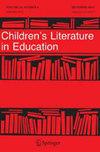Paralanguage in the Translation of Children’s Graphic Novels into Arabic: Jeff Kinney’s Diary of a Wimpy Kid
IF 0.6
4区 文学
0 LITERATURE
引用次数: 0
Abstract
Abstract Graphic novels are marketed as helpful for reluctant young readers. The supplementation of text with visual stimuli as part of a multimodal narrative is often claimed to improve reading comprehension and motivation in children and young adolescents. The translation into Arabic of Jeff Kinney’s Diary of a Wimpy Kid series, by comparison, fails to deliver an equally engaging reading experience. In the Arabic versions of Rodrick Rules and Hard Luck , language acts as an obstacle to comprehension due to the misrepresentation of textual paralanguage, broadly defined as the written representation of nonverbal aspects of communication including tone, stress and volume. As paralanguage is also involved in character portrayal, this translation approach paints a rather dull image of the series’ protagonist Greg. Using the textual paralanguage typology proposed by Luangrath et al. (J Consum Psychol 27:98–107, 2017), the case is made here for closer attention in translation to the pragmatic meanings contained in textual paralanguage. As the novel evolves to incorporate an ever-expanding array of multimodal elements, so should the translation strategies involved in rendering these texts into other languages.儿童图画小说在阿拉伯语翻译中的辅助语言:杰夫·金尼的《小瘸子日记》
图画小说被推销为对不情愿的年轻读者有帮助。作为多模态叙事的一部分,文本与视觉刺激的补充通常被认为可以提高儿童和青少年的阅读理解和动机。相比之下,杰夫·金尼(Jeff Kinney)的《小屁孩日记》(Diary of a winpy Kid)系列的阿拉伯语译本就没能提供同样吸引人的阅读体验。在阿拉伯语版的《罗德里克规则》和《Hard Luck》中,由于对文本副语言的误读,语言成为理解的障碍。文本副语言被广义地定义为对沟通的非语言方面的书面表达,包括语气、重音和音量。由于副语言也涉及到角色的塑造,这种翻译方式将主人公格雷格的形象描绘得相当沉闷。使用Luangrath等人提出的语篇副语言类型学(J consumer Psychol, 2017),在这里提出这个案例是为了在翻译中更密切地关注语篇副语言中包含的语用意义。随着小说的发展,多模态元素的数量不断增加,将这些文本翻译成其他语言的翻译策略也应如此。
本文章由计算机程序翻译,如有差异,请以英文原文为准。
求助全文
约1分钟内获得全文
求助全文
来源期刊

CHILDRENS LITERATURE IN EDUCATION
LITERATURE-
CiteScore
1.40
自引率
25.00%
发文量
38
期刊介绍:
Children''s Literature in Education has been a key source of articles on all aspects of children''s literature for more than 50 years, featuring important interviews with writers and artists. It covers classic and contemporary material, the highbrow and the popular, and ranges across works for very young children through to young adults. It features analysis of fiction, poetry, drama and non-fictional material, plus studies in other media such as film, TV, computer games, online works; visual narratives from picture books and comics to graphic novels; textual analysis and interpretation from differing theoretical perspectives; historical approaches to the area; reader-response work with children; ideas for teaching children''s literature; adaptation, translation and publishing.
CLE is a peer-reviewed journal covering children''s literature worldwide, suitable for professionals in the field (academics, librarians, teachers) and any other interested adults.
- Features stimulating articles and interviews on noted children''s authors
- Presents incisive critiques of classic and contemporary writing for young readers
- Contains articles on fiction, non-fiction, poetry, picture books and multimedia texts
- Describes and assesses developments in literary pedagogy
- Welcomes ideas for ‘special issues’ on particular themes or critical approaches
 求助内容:
求助内容: 应助结果提醒方式:
应助结果提醒方式:


